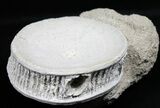This Specimen has been sold.
Giant Otodus Shark Vertebra - 4 Inches Wide!
This is the large vertebra of Otodus obliquus that we've ever seen. At 4 inches wide it would equate to a shark close to 40 feet in length. It was collected from the phosphate deposits in the Oulad Abdoun Basin of Morocco. The preparation work is top notch and it displays nicely on a flat surface.
The fossils of Otodus indicate that it was a very large predatory shark. Based on the size of the largest known teeth and vertebrae Otodus may have reached a maximum size of nearly 40 feet in length. Otodus likely preyed upon marine mammals, large bony fish, and other sharks. It was among the top predators of its time.
Scientists determined that Otodus evolved into the genus Carcharocles, given substantial fossil evidence in the form of transitional teeth. Some teeth have been excavated from the sediments of the Potomac River in Maryland, USA, Ypres clay in Belgium, and western Kazakhstan, which are morphologically very similar to Otodus teeth but with lightly serrated cusplets and a serrated cutting edge. These transitional fossils suggest a worldwide evolutionary event, and support the theory that Otodus eventually evolved into Otodus aksuaticus and thus initiated the Carcharocles lineage.
The fossils of Otodus indicate that it was a very large predatory shark. Based on the size of the largest known teeth and vertebrae Otodus may have reached a maximum size of nearly 40 feet in length. Otodus likely preyed upon marine mammals, large bony fish, and other sharks. It was among the top predators of its time.
Scientists determined that Otodus evolved into the genus Carcharocles, given substantial fossil evidence in the form of transitional teeth. Some teeth have been excavated from the sediments of the Potomac River in Maryland, USA, Ypres clay in Belgium, and western Kazakhstan, which are morphologically very similar to Otodus teeth but with lightly serrated cusplets and a serrated cutting edge. These transitional fossils suggest a worldwide evolutionary event, and support the theory that Otodus eventually evolved into Otodus aksuaticus and thus initiated the Carcharocles lineage.
SPECIES
Otodus obliquus
AGE
LOCATION
Oulad Abdoun Basin, Morocco
FORMATION
Phosphate Deposits
SIZE
4" wide
CATEGORY
SUB CATEGORY
ITEM
#31399
We guarantee the authenticity of all of our specimens.
 Reviews
Reviews













